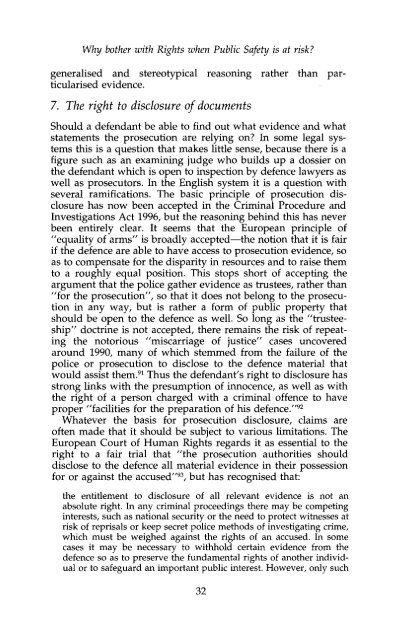Human Rights, Serious Crime and Criminal Procedure - College of ...
Human Rights, Serious Crime and Criminal Procedure - College of ...
Human Rights, Serious Crime and Criminal Procedure - College of ...
- No tags were found...
You also want an ePaper? Increase the reach of your titles
YUMPU automatically turns print PDFs into web optimized ePapers that Google loves.
Why bother with <strong>Rights</strong> when Public Safety is at risk?generalised <strong>and</strong> stereotypical reasoning rather than particularisedevidence.7. The right to disclosure <strong>of</strong> documentsShould a defendant be able to find out what evidence <strong>and</strong> whatstatements the prosecution are relying on? In some legal systemsthis is a question that makes little sense, because there is afigure such as an examining judge who builds up a dossier onthe defendant which is open to inspection by defence lawyers aswell as prosecutors. In the English system it is a question withseveral ramifications. The basic principle <strong>of</strong> prosecution disclosurehas now been accepted in the <strong>Criminal</strong> <strong>Procedure</strong> <strong>and</strong>Investigations Act 1996, but the reasoning behind this has neverbeen entirely clear. It seems that the European principle <strong>of</strong>"equality <strong>of</strong> arms" is broadly accepted—the notion that it is fairif the defence are able to have access to prosecution evidence, soas to compensate for the disparity in resources <strong>and</strong> to raise themto a roughly equal position. This stops short <strong>of</strong> accepting theargument that the police gather evidence as trustees, rather than"for the prosecution", so that it does not belong to the prosecutionin any way, but is rather a form <strong>of</strong> public property thatshould be open to the defence as well. So long as the "trusteeship"doctrine is not accepted, there remains the risk <strong>of</strong> repeatingthe notorious "miscarriage <strong>of</strong> justice" cases uncoveredaround 1990, many <strong>of</strong> which stemmed from the failure <strong>of</strong> thepolice or prosecution to disclose to the defence material thatwould assist them. 91 Thus the defendant's right to disclosure hasstrong links with the presumption <strong>of</strong> innocence, as well as withthe right <strong>of</strong> a person charged with a criminal <strong>of</strong>fence to haveproper "facilities for the preparation <strong>of</strong> his defence." 92Whatever the basis for prosecution disclosure, claims are<strong>of</strong>ten made that it should be subject to various limitations. TheEuropean Court <strong>of</strong> <strong>Human</strong> <strong>Rights</strong> regards it as essential to theright to a fair trial that "the prosecution authorities shoulddisclose to the defence all material evidence in their possessionfor or against the accused" 93 , but has recognised that:the entitlement to disclosure <strong>of</strong> all relevant evidence is not anabsolute right. In any criminal proceedings there may be competinginterests, such as national security or the need to protect witnesses atrisk <strong>of</strong> reprisals or keep secret police methods <strong>of</strong> investigating crime,which must be weighed against the rights <strong>of</strong> an accused. In somecases it may be necessary to withhold certain evidence from thedefence so as to preserve the fundamental rights <strong>of</strong> another individualor to safeguard an important public interest. However, only such32
















